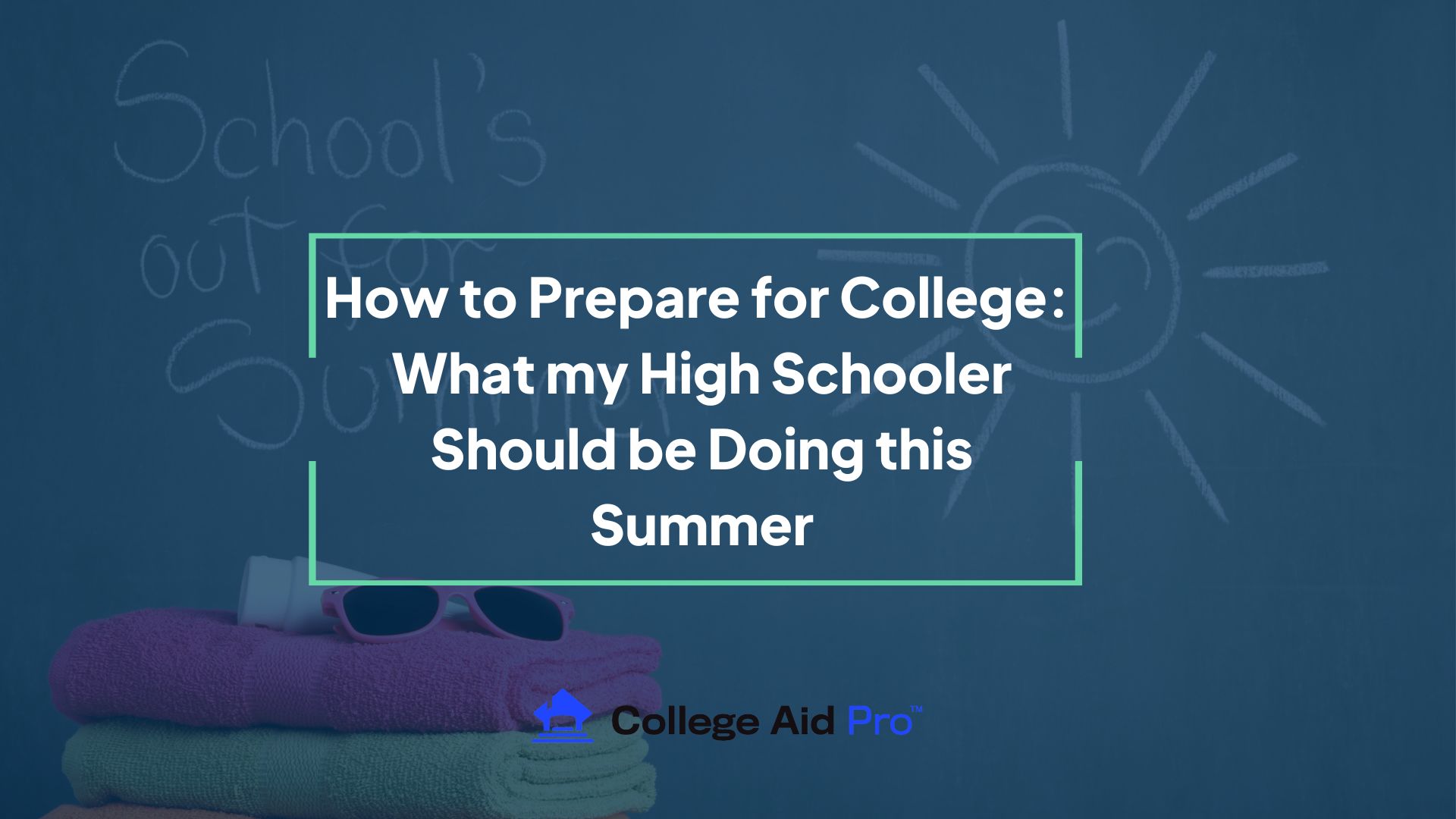Ah summer. The sun is shining, you’re spending more time out and about, getting in some family vacations, and generally trying to relax before the next school year starts. Although your student is probably not interested in college prep (especially if they’re younger) it’s still important to get them thinking or taking action on a few things while they have some downtime. If you break it up over the summers they have through high school, it takes away some of the overwhelming load during their senior year and helps you all feel more prepared for this next phase.
But that brings up the question, what should your high school student be doing this summer? We’ve broken down how to prepare for college based on each school year your child has completed so you know how to help your student excel no matter where they are in their college prep journey.
How to prepare for college summer after freshman year of high school
Although it feels like they just started high school (because they did) no summer between high school years should be wasted! Have they identified potential career paths and what school would be best to go to achieve those goals? Is there somewhere they really enjoy helping or volunteering? Are there hobbies or interests that your freshman has shown interest in, but just hasn’t had the time to pursue them or learn more about them? THIS is the summer to start!

- Volunteer
- Many colleges and scholarships like to see volunteer hours on applications. This is a great opportunity to not only have your student gain valuable life experience, but potentially test out a field they might have interest in. For example, if they think they’d like to be a veterinarian, have them look into volunteering at local shelters or vet clinics. This is a low stakes and early experience so they won’t start their path in college and panic when it isn’t everything they expected.
- Get a job
- Although many service jobs only open at 16, there are other opportunities like mowing lawns, babysitting, dog sitting, other kinds of yard work, etc.
- Think about college major/career
- Your student likely knows what subjects interest them the most. This summer is a great time to see how their interests can translate into a career and potential college major some day.
- Look into colleges with programs that match their interests
- Although your student is still a ways out from making final college choices, it’s best to start thinking early about which college can help them fulfill their career interests. Once they’ve decided what kind of career they want, have them look into colleges that offer that degree path and how that program ranks at the state and national levels. Also have them map out any post-graduate school that may be necessary for the particular career(s) they are interested in.
How to prepare for college summer after sophomore year of high school
Sophomore year may have been a bit easier and felt more comfortable compared to freshman year. Now that they can breathe and prepare to be an upperclassman, it’s important for your student to look into getting a summer job and some ACT/SAT prep since they’ll likely be taking their exam either the coming school year or early the next.
- Summer job
- Likely, your student is 16 by the time they hit the summer of their Sophomore year. This is a great time to get a summer job. Many employers welcome high school help through the summers. Have them check job posting sites like Indeed, drive by some of their favorite places and see if they are hiring, or ask around your school or your neighborhood. Local Facebook groups are also a great place to search or ask about opportunities as well.
- Low-pressure college campus visits
- This summer is a great time to visit college campuses just to “feel them out” without the pressure that sometimes starts creeping in during junior year. We recommend visiting small, medium, and large campuses in different geographic locations (urban, suburban, etc) to know what size campus and what kind of area your student would may be interested in.

- ACT/SAT prep
- Test prep runs the gamut from one-on-one tutoring, group sessions, DIY books, and internet learning. There’s no excuse NOT to do some prep for your standardized tests and summer is an excellent time to do it. You may not need to spend hours studying and cramming, we do suggest you do some prep for the exams, understand how they work, and get any tips to help your student excel on these tests.
- A great place to start is by taking practice exams and identifying which test is better for your student. While the ACT and SAT are similar, there are also differences. Many students find they prefer one over the other, and can get a better score as a result. Determine what test “fits” your student and then focus on test prep for EITHER the SAT or the ACT. These exams are important for not only getting into universities, but also possible scholarship opportunities granted based on your student’s test score.
How to prepare for college summer after junior year of high school
If your child is heading into their senior year of high school, this is when many feel it’s “crunch time.” Before your child gets ‘senioritis,’ spend this summer getting ahead of the power curve. Remember, there’s a lot going on during your student’s senior year of high school. The more you can get checked off the college to-do list this summer, the less stress you’ll feel when the school year starts! Make sure you have a solid college list that fits your financial, social, emotional wants and needs, schedule and plan any school tours you haven’t done yet, and learn about the FAFSA and CSS Profile. Above all, stay organized! Figure out the best way to communicate and check it with your student as they prepare for their last year of high school. Make sure you stay on top of and meet deadlines for things like college and scholarship applications, financial aid forms, and school deposits.
- Selecting Top Schools
- Choosing a college is highly personal. Whether it’s proximity to home, different programs offered, post-graduate placement, cost of attendance, or general university culture fit, the summer between junior and senior year is a great time to look into and make final selections on schools.
- College Applications
- While schools don’t usually start accepting applications until August, there are many ways to start working on them
- The Common App, a single online college application form used by over 900 colleges and universities, opens August 1st, but you can create your account, add the colleges you are applying to, fill out the general information, and work on your required essay now! If the schools you’ve added to your list require extra (supplemental) essays or short answer questions, wait until August 1st in case the individual schools update them
- Net Price Calculator
- If you’re unsure what college might cost your child, it’s important to get a good grasp on the potential price point early with a trusted Net Price Calculator, like the one found on MyCAP. Preparing for college costs sets up clear expectations for all parties. It also gives your student the opportunity to review their top schools list and see if they match your price point. There are always opportunities for scholarships and other forms of financial aid, but the calculators are a great planning tool to give you an idea of what your net price will be for the schools on your list, including your financial safety schools.
- Research and apply for scholarships
- Take time to learn about local and national scholarships your student may be eligible for, and what the requirements might be (GPA, extra curriculars, SAT/ACT scores, essays, etc.). You can see which scholarships would be worthwhile to invest time in and create a calendar with deadlines to complete each scholarship application by. You might be surprised to see some are open now! Be sure your student applies for these now to get as many scholarship applications done sooner rather than later.

- Learn about the FAFSA and CSS Profile
- Doing research before filling out the FAFSA or CSS profile gives you and your student a huge advantage when completing the forms. These are nuanced forms and are intentionally difficult or confusing. But when you know what to expect and follow FAFSA/CSS profile best practices, then you can get the most money possible granted to your family.
How to prepare for college summer after senior year of high school
If your child is heading to college in the fall, congratulations! That is an amazing accomplishment, and should be celebrated. There are a few things they can still do to ensure they’re fully prepared for college and help them save some money on tuition in the process.
- Take a summer session at a community/local college
- This is a great opportunity to get credit hours without having to pay full tuition price at the larger college your child is going to. It allows them to take a required general education course and get it out of the way, so they can focus on the classes they’d really like to take and get to classes in their major sooner. Before your child pays for the summer class, double check that the class will transfer to the university.
- Get a summer job
- This likely is already in their plans, but we recommend helping them set up a system of savings that won’t make their summer job feel so tedious. Set up a percentage to go to tuition savings, a percentage to go into personal savings, and another percentage for them to have as “fun” money gives them

- Take a summer trip with friends
- Although this may not save them money, it can give your student some great memories with friends they likely won’t see for a while after starting school. Giving your student the independence and room to explore on their own gives them a taste of college life and some lifelong stories they’ll love to look back on.
While summer is a time to relax, enjoy some down time, and just hang out, your students can still spend a slice of summer preparing for college. We encourage you to carve out a little time with your high school student before they totally downshift into the lazy days of summer and develop a plan for this summer. A little bit of effort each summer will make such a difference!



